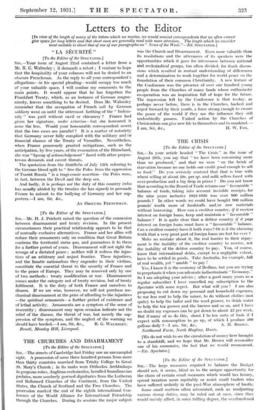[To the Editor of the SPECTATOR.] SIR,—Mr. H. J. Prickett
raised the question of the connexion between disarmament and treaty revision. In the present circumstances their practical relationship appears to be that of mutually exclusive alternatives. France and her allies will reduce their armaments only on condition that Great Britain confirms the territorial status quo, and guarantees it to them for a further period of years. Disarmament will not right the wrongs of a dictated peace ; neither will it redress the injus- tices of an arbitrary and unjust frontier. These injustices, and the fanatic nationalism they engender in their victims, constitute the essential threat to the security of France and to the peace of Europe. They may be removed only by one of two methods : treaty modification or war. Disarmament comes under the category not of treaty revision, but of treaty fulfilment. It is the duty of both France and ourselves to disarm. If we are wise, however, we will not purchase me- chanical disarmament at the price of affording to the injustices —the spiritual armaments—a further period of existence and of lethal activity. Armaments are a symptom of the sense of insecurity ; disarmament may upon occasion indicate not the relief of the disease, the threat of war, but merely the sup- pression of the symptom, and the neglect of the warning we should have heeded.—I am, Sir, &c., R. G. WALMSLEY. Bronti, Mossley Hill, Liverpool.






























 Previous page
Previous page